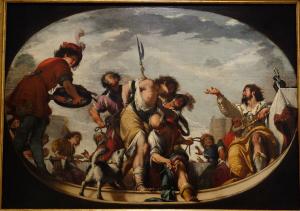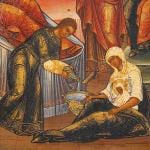
Jesus, in various parables, indicates that he desires everyone to partake of the kingdom of God, the good and the bad, the rich and the poor. This can be found especially in the way he preached, where we can find an indication of the preferential option he gave for the outcast, those ridiculed by society, that is for the poor and vulnerable. They were close to his heart. They were the ones who were most affected by social sin. They needed to be liberated, they needed to be treated, not just as humans, but as people made in the image and likeness of God, meaning, they can and should represent God to us. Unsurprisingly, because this challenged the rich and powerful, those who wanted to hold onto all they have gained as a result of the sinful structures of society, the poor and needy were the ones most likely to heed Jesus. They were not so attached to their present circumstances: they wanted things to change, they wanted things to be better, and so they were willing to do what it takes to affect such change and experience the kingdom of God in their lives.
The call for salvation is universal; God wants to embrace all who would come to him and embrace him. He wants all to be saved. But he will not force people to be saved. People must come to him; they must embrace him, they must be willing to integrate his grace into their lives. Thus, with a parable, he explains how the kingdom of God is like a marriage feast for a king’s son: the servants are sent out far and wide to invite as many people as they can, but at the feast itself, those who do not come prepared, that is, those who came without a proper wedding garment, were cast out:
And again Jesus spoke to them in parables, saying, “The kingdom of heaven may be compared to a king who gave a marriage feast for his son, and sent his servants to call those who were invited to the marriage feast; but they would not come. Again he sent other servants, saying, `Tell those who are invited, Behold, I have made ready my dinner, my oxen and my fat calves are killed, and everything is ready; come to the marriage feast.’ But they made light of it and went off, one to his farm, another to his business, while the rest seized his servants, treated them shamefully, and killed them. The king was angry, and he sent his troops and destroyed those murderers and burned their city. Then he said to his servants, `The wedding is ready, but those invited were not worthy. Go therefore to the thoroughfares, and invite to the marriage feast as many as you find.’ And those servants went out into the streets and gathered all whom they found, both bad and good; so the wedding hall was filled with guests. “But when the king came in to look at the guests, he saw there a man who had no wedding garment; and he said to him, `Friend, how did you get in here without a wedding garment?’ And he was speechless. Then the king said to the attendants, `Bind him hand and foot, and cast him into the outer darkness; there men will weep and gnash their teeth.’ For many are called, but few are chosen” (Matt. 22:1-14 RSV).
Often, the wedding garment has been interpreted as indicating someone who has been baptized, that through baptism, we are welcomed to the eschatological feast of the Lamb of God. While there is truth to this, insofar as baptism purifies us and grants us further graces, the key is to realize that we need to cooperate with God, to cooperate with grace, to let it transform us so that we become fully clothed in the image and likeness of God. The grace given in baptism, the grace which is also given in extraordinary means outside of sacramental baptism (such as in baptism of desire), cleanses us from the stain of sin. Nonetheless, we need to act upon that grace, to cooperate with it, to let it take us from our sinful state and transform us so that God can then, in the eschaton, recognize his image in us and welcome us as one sealed with grace, sealed with wedding garment which allows us eternal access to the kingdom of God. That is, those who are welcomed in the kingdom of God are those in whom the image and likeness of God can be discerned. They belong to the kingdom of God, for they conform to the likeness of God.
We are all made in the image and likeness of God; it is our true face. But we have abandoned it. We have covered it up with sin. It is defaced. But that image, veiled by sin, can once again be uncovered. We must cooperate with God’s grace, and willingly put on, again, our original face, revealing who we truly are, so that we will be welcomed by God in his eschatological kingdom. It is where we belong. It is both our origin and where we seek to go. It is all around us, but, so long as we have covered up the image and likeness of God with sin, so long as we do not cooperate with grace, we do not reveal the wedding garment and so find ourselves, from our own free will, no longer experiencing the kingdom which is around us. We have been kicked out into the outer darkness of sin, our own sin, that is, into the abyss of our own doing. So long as we do not cooperate with grace, so long as we do not let it direct us and help us reveal our true face, we shall be out wandering far away from our true home. Our sin will be its own punishment; our grief and sorrow, our weeping will, in part, be what we make for ourselves.
Thus, the ministers of God, like Paul, are sent out to help us, to offer us the grace which we need in order to properly attain our true face. “But it is God who establishes us with you in Christ, and has commissioned us; he has put his seal upon us and given us his Spirit in our hearts as a guarantee” (2 Cor. 2:21-22 RSV). Their role is important, but not essential. We must realize they are instruments which God uses. We must also understand that God can and does often use other means to share his grace. The seal of God is upon ministers to vouchsafe the fact that they will be vessels of God’s grace, whether or not they are worthy of that grace or cooperate with it themselves. Donatism fails to understand this, as it thinks the seal of God’s grace lies, not with God, but the minister themselves. Thus, unworthy ministers can be vessels of God’s grace, helping many receive the grace they need. But because grace is of God, and not the ministers, this also means we should not fall into some sort of clericalism which thinks God exclusively works with ordained ministers who can then lord it over others or threaten to withhold God’s grace to the world. God is not bound by the sacrament. God is not bound by such ministers: he can and will give his grace to those who truly seek it out, to those who are willing to conform themselves to it insofar as they know and understand what God expects of them. This is also why, if we go to those who we have good reasons to believe are ministers of grace, will be able to receive grace, even if such ministers are not properly ordained for such service, for God can and will provide what is lacking.
The kingdom of God truly is open to all. God has sent out his servants to call everyone to that kingdom. But before we go, we must make ourselves ready. We must let the image and likeness of God, given to us in our creation, shine forth as the indication that we truly belong in the kingdom of God. All that is in the kingdom of God will reveal God. All those who do not reveal God, because they cover his image with sin, will find themselves not yet ready for the kingdom of God and will be told to leave. And yet, they still are called. Everyone has a chance to put on the garment. And if they do, then they will be welcomed, for God truly desires everyone to be with him in eternal beatitude.
Stay in touch! Like A Little Bit of Nothing on Facebook.
If you liked what you read, please consider sharing it with your friends and family!













